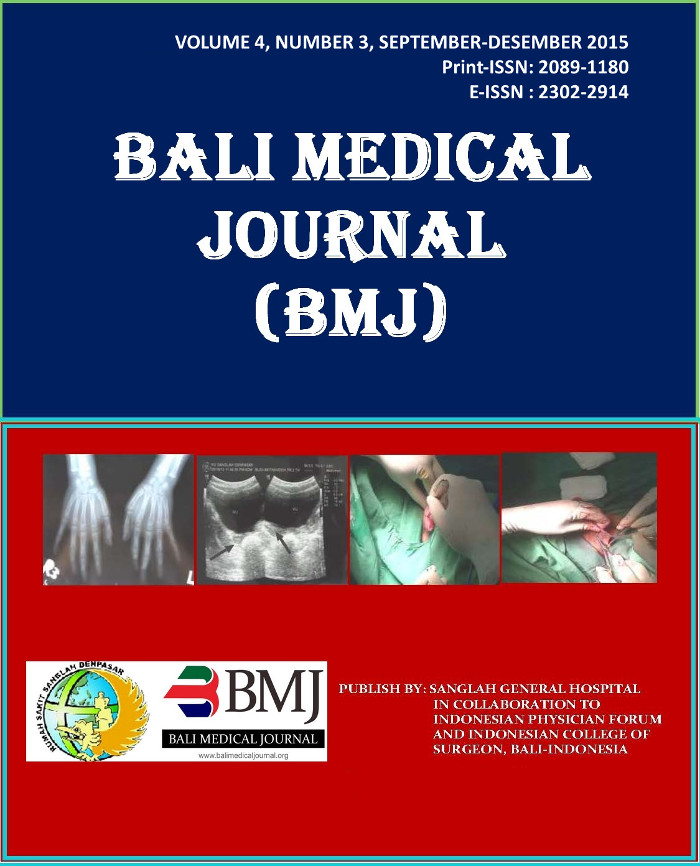LOW MOLECULAR MASS POLYPEPTIDE AND TRANSPORTER ANTIGEN PEPTIDE GENES POLYMORPHISM AS THE RISK FACTORS OF CERVICAL CANCER WHICH CAUSED BY HUMAN PAPILLOMAVIRUS TYPE-16 INFECTION IN BALI
Abstract
Background: Until recently, cervical cancer is one of the major problem in women’s health issue related to its high incidence and mortality rate. The etiology of cervical cancer is the high risk oncogenic group of Human Papillomavirus (HPV), especially HPV-16 and 18 and its phylogenies. Meanwhile in Bali, more than 50% of infection are caused by HPV-16 infection. The main objective of this study was to investigate the role of LMP-2, LMP-7, TAP-1 and TAP-2 gene polymorphism as the risk factor in the cervical cancer carcinogenesis that is caused by HPV-16 infection. Method: A nested non-paired case-control study was conducted at Obstetric and Gynecologic Department Sanglah General Hospital, Bali Indonesia from March 1 until August 31, 2013. Laboratory testing was carried out at Laboratory of Histopathology Leiden University Medical Centre, Netherlands,. Results: A total of 40 samples were collected, consist of 20epithelial cervical cancer patients with positive HPV-16 infection as the case group and 20 non-cervical cancer patients with positive HPV-16 infection as the control group. Women infected by HPV-16 with LMP-7 gene polymorphism had a higher risk (OR=7.36, CI 95%=1.38-40.55, p=0.013) to be diagnosed with cervical cancer. Balinese women who were infected by HPV-16 with TAP-2 gene polymorphism had a higher risk (OR= 9.33, CI 95%=2.18-39.96, p=0.001) to be diagnosed with cervical cancer. Meanwhile, Balinese women who were infected by HPV-16 with LMP-7 and TAP-2 genes polymorphism had a higher risk (OR=12.67, CI 95%=1.40-114.42, p=0.020) to be diagnosed with cervical cancer. As the result, it was shown that both of this gene polymorphism was working synergistically. Conclusion: TAP-2 and LMP-7 genes polymorphism play a role in the carcinogenesis mechanism of cervical cancer that is caused by HPV-16 infection in Bali. Meanwhile, LMP-2 and TAP-1 genes polymorphism were not found to play a role in the immunology pathway of cervical cancer that is caused by HPV-16 infection.Downloads
Download data is not yet available.
Published
2015-12-29
How to Cite
MAHENDRA, I Nyoman Bayu.
LOW MOLECULAR MASS POLYPEPTIDE AND TRANSPORTER ANTIGEN PEPTIDE GENES POLYMORPHISM AS THE RISK FACTORS OF CERVICAL CANCER WHICH CAUSED BY HUMAN PAPILLOMAVIRUS TYPE-16 INFECTION IN BALI.
BALI MEDICAL JOURNAL, [S.l.], v. 4, n. 3, dec. 2015.
ISSN 2302-2914.
Available at: <https://ojs.unud.ac.id/index.php/bmj/article/view/21749>. Date accessed: 21 feb. 2026.
Issue
Section
Articles
Keywords
cervical; cancer; HPV-16; LMP and TAP; genes polymorphism.


